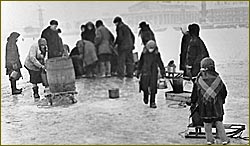Printed from: http://petersburgcity.com/news/city/2012/01/27/Oborona_Leningrad_270112/
City news, 27.01.2012 20:06
Blockade survivors gather in St. Petersburg

Russian Prime Minister Vladimir Putin laid a commemorative wreath at the Piskaryovskoye cemetery in St. Petersburg and met with veterans as the city observes the 68th anniversary of the fall of the Nazi blockade.
The battle of Leningrad – that was St. Petersburg’s previous name - was the longest-fought WWII battle. The 900-day siege of the city on the Neva claimed about one million lives. Hitler wanted to raze Leningrad down but the Soviet army broke through German positions and cut open a life corridor through which truck convoys rushed vital supplies into the starving and deep-frozen city. The blockade was fully lifted on January 27, 1944. Hitler lost 50 divisions near Leningrad.
On Friday, more than 130 people gathered in St. Petersburg for the 21st conference of the International Association of Leningrad Siege Survivors’ Societies. The Voice of Russia correspondent Anatoly Novosyolov has sent this report:
"Delegates from 30 Russian regions and from eleven foreign countries, including CIS and Baltic republics and Israel, will sit down to discuss important issues: preserving the memory of the 900-day heroic defense of the city on the Neva and fighting distortions of the history of the Great Patriotic War of 1941-1945. There will be a roundtable, a presentation of the book titled “Letters from the Blockade”, meetings between the forum’s participants and deputies of the St. Petersburg Legislative Assembly, a flower laying ceremony at the Piskaryovskoye memorial, and, finally, a concert at the Oktyabrsky Concert Hall in the evening."
Leningrad siege survivors’ societies operate in more than 100 cities across the globe. Eduard Pavlov is Chairman of the Kiev society of blockade survivors, which comprises 150 veterans.
"This year we have found yet another fellow blockade survivor. She was born in 1911. In 1937, she graduated from the Leningrad Conservatory and joined the orchestra of the Musical Comedy Theater, the only theater that kept functioning in the besieged Leningrad. Before being sent to the front, soldiers came to watch a performance that could be the last one in their life. Later, she moved to Kiev where she has been living ever since. This month, we received congratulations for Olga Alexandrovna Shetova from President Viktor Yanukovych and from the director of the Taras Shevchenko Opera and Ballet Theater where she had worked. We have found her and celebrated her centennial birthday."
A blockade survivor and the forum’s delegate Yelena Druts has said that she experiences mixed feelings of sadness and joy when she comes to St. Petersburg.
"I was born in Leningrad and stayed there throughout all the 900 days of the siege. In 1990, I moved to Israel. I am a doctor and the head of a blockade survivors’ society in Ashkelon. In Israel, we have all the attention we need. There are blockade survivors in nearly every Israeli city. We were given medals and social support. I have a son and a grandson and I tell them everything about the blockade. They are very attentive to my stories. But it’s very hard to speak when you start recalling those things. I want to make my son a descendant of a blockade survivor."
A special Internet portal (lenigradpobeda.ru) has been launched for those who want to share their reminiscences of or learn more about the blockade. Its main sections are “The Chronicle of the 1941-1945 Events”, “Radio in the Besieged Leningrad”, “Art in the Besieged City”, “All for the Victory”, “A Walk around Leningrad”, and others. There is a lot more at this interactive museum of Leningrad’s defense, created by modern Petersburgians.
News source: Voice of Russia
|
